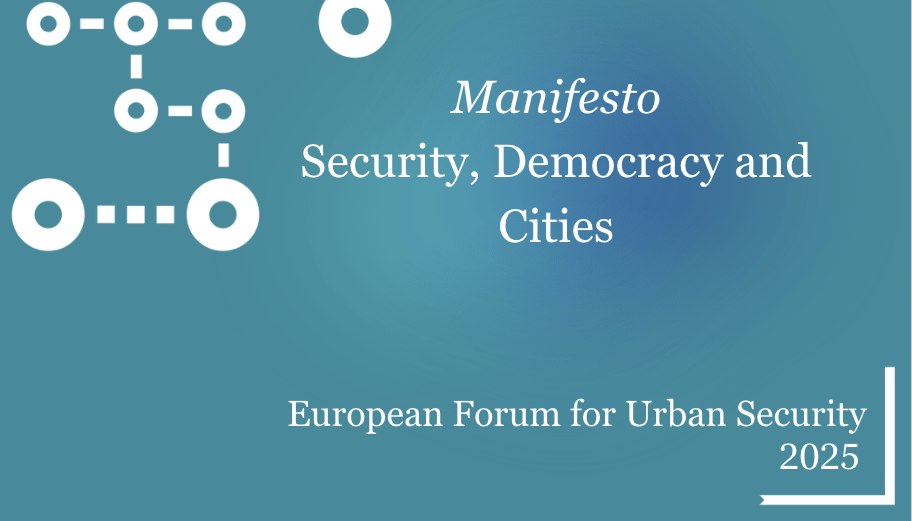Nice, France, October 2021 – Efus’ 7th Security, Democracy and Cities conference concluded on 22 October in Nice (France) – after three days of rich debates attended by 700 delegates representing 140 cities and 27 countries –, by the adoption of an eponymous Declaration in which Efus’ member local authorities call European institutions to better recognise their key role in managing urban security by strengthening exchange and funding mechanisms.
The Security, Democracy and Cities Declaration was signed during the closing session by Efus President and Mayor of Liège (Belgium), Willy Demeyer, and Efus Vice-President and Mayor of the host city of Nice, Christian Estrosi. In the name of Efus members, it calls for heightened and more agile cooperation as well as adequate financial support between the local, national and European levels of governance. It also calls for the establishment of a Convention of Mayors for Security that would enable European local authorities to jointly respond to the many challenges they are facing.
Local authorities are facing many crises
Although it’s impossible to summarise all the exchanges that took place over three intense days, we can pinpoint several ideas on which there was a consensus. Many speakers and attendees, in particular European mayors, stressed that since the last Security, Democracy and Cities (SDC) conference in Barcelona in 2017, local authorities have been on the front line of several global crises that have directly impacted local life and management.
- The Covid pandemic has shown local authorities’ resilience and capacity for innovation as well as their proximity with citizens. However, it has generated new forms of crime and trafficking, accelerated phenomena such as polarisation, and brought into sharp focus social and economic inequalities.
- Climate disasters have directly affected several Efus member cities: floods in Germany and Belgium and wildfires in southern Europe last summer, and the Alex storm in Nice in October 2020. For the first time, the conference included a workshop on the consequences of climate change on urban security.
- The rise of new surveillance technologies and the ethical questions they raise. Public authorities have made widespread use of these throughout the pandemic. Local authorities are keen to have more information as well as training on how to select the technologies that are best adapted to local needs, and on how to use them without infringing on fundamental rights. More broadly, an increasing number of local authorities are recognising that crime prevention is as important in the online space as in the physical one.
- The protection of public spaces from terrorism, among other threats, was also a major topic, notably for the host-city of Nice, which was struck on 14 July 2016 by a terrorist attack on the iconic Promenade des Anglais, and on 29 October 2020 by an attack in the church of Notre-Dame.
- Increasing social and economic inequalities were often mentioned as a factor of delinquency and polarisation, and a risk for our democratic systems.
- Another important topic was organised crime, which directly affects a number of member cities, as it infiltrates the local economy and adapts constantly (notably to the restrictions linked to the pandemic).
18 thematic workshops
Eighteen workshops were held during the conference covering the main urban security topics on which Efus’ members are currently working: climate change, discrimination, drugs, crisis management, citizen participation, polarisation, the protection of public spaces, tourism and security, nightlife… In total, some 80 speakers contributed to these sessions.
Short reports on these sessions are available in our thematic sections.

See the list of workshops and speakers in the conference programme.
10 field visits
In keeping with Efus’ mission of facilitating the exchange of practices among its members, 10 field visits were organised in Nice to showcase some of the city’s security schemes as well as initiatives from local associations. For the first time this year, these visits were hosted by both a local representative and one from an Efus member local authority, with the aim of comparing and sharing experiences between cities.

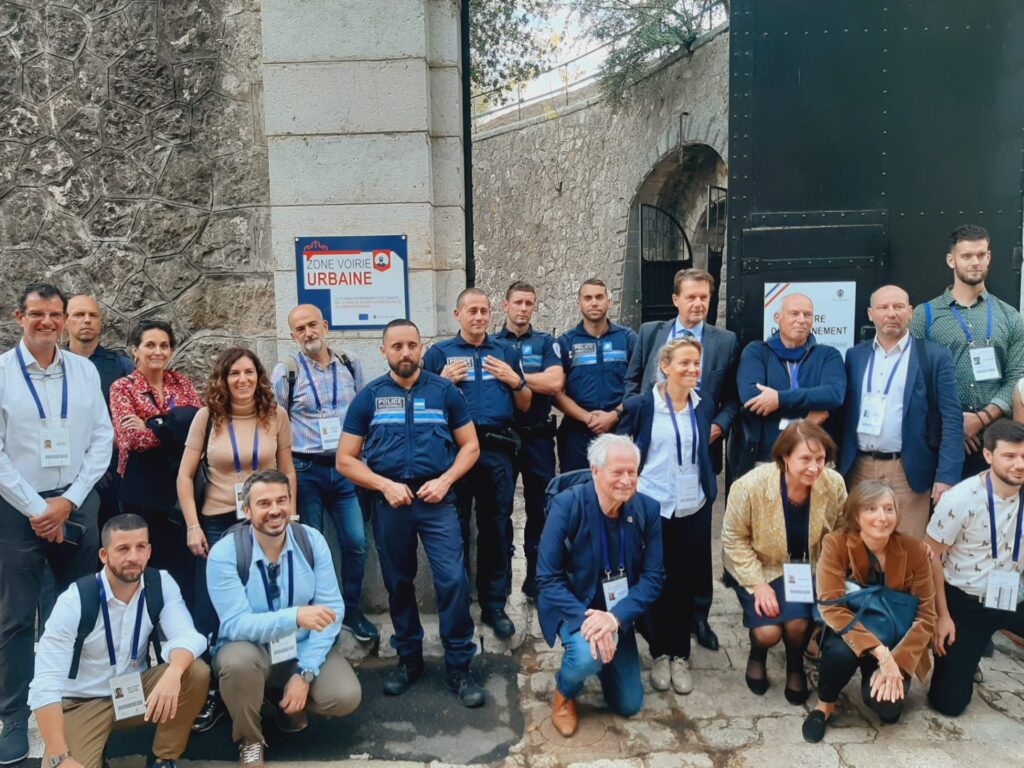
Participants were shown the new security equipment protecting the Promenade des Anglais from ram-vehicle attacks; the Urban Supervision Centre that manages all the information collected by the local CCTV network; the training centre used by the national and local police as well as the gendarmerie; the local transport system’s protection and surveillance system, and various local associations operating in the fields of crime prevention at school, popular education, and assistance to victims of domestic and gender violence.
12 Focus sessions
The conference attendees were also offered opportunities for debate and exchange through 12 Focus sessions held during the breaks, between the thematic workshops. These were short, 15-minute sessions where a speaker (selected by Efus upon application) would present a practice, or a concrete area of research, for example Changing public policies’ paradigm on drugs in Europe presented by the international NGO Law Enforcement Action Partnership (LEAP); a project carried out by Civipol, the French Ministry of the Interior’s international cooperation branch, to help Lebanese authorities establish a community police force, and a presentation by the students of France’s Sustainable Design School, which is involved in the PACTESUR project led by the City of Nice and in which Efus is a partner.
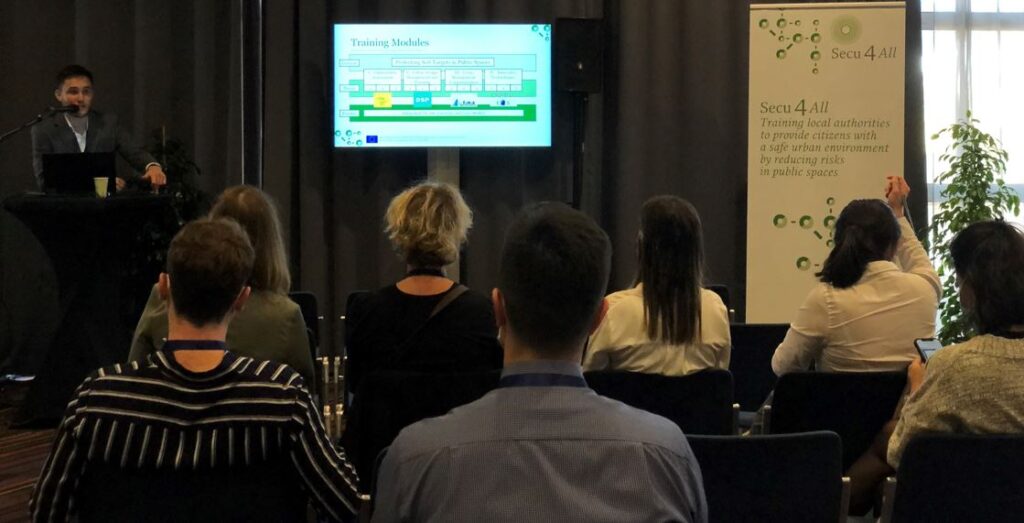
The list of all the Focus session is available in the conference programme.
Panel of European mayors
Another prominent feature of the conference was the panel of European mayors on the topic of Cities as leaders in security, innovation and solidarity, which was presented by Willy Demeyer and gathered representatives and/or elected officials from the cities of Bialystok (Poland), Lomme/European Metropolis of Lille (France), Matosinhos (Portugal), Mannheim (Germany), Prato (Italy), Vilvorde (Belgium) and the Government of Catalonia (Spain).
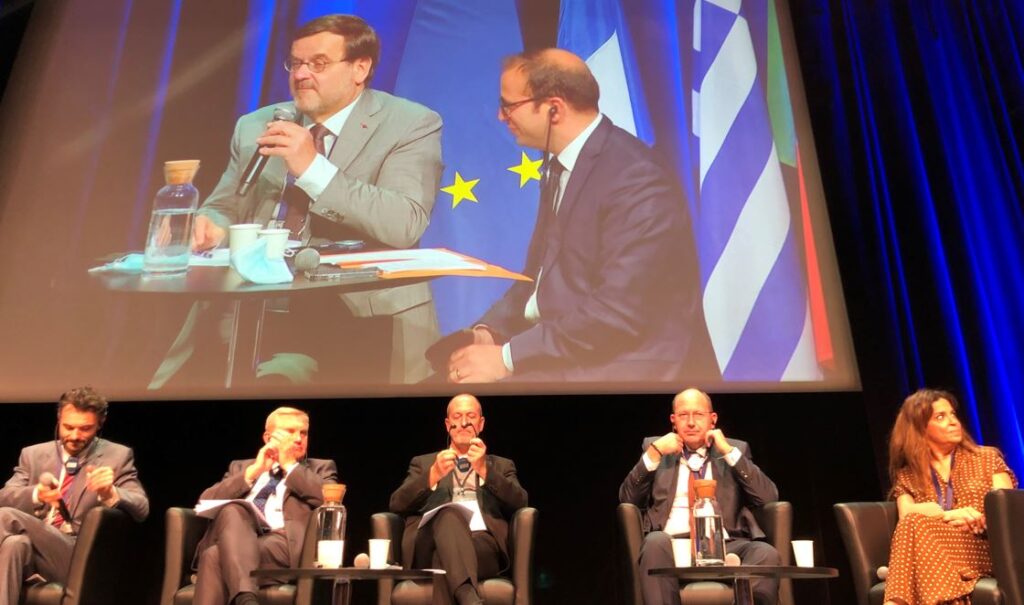
We will shortly publish a report on this session.
A strong European presence

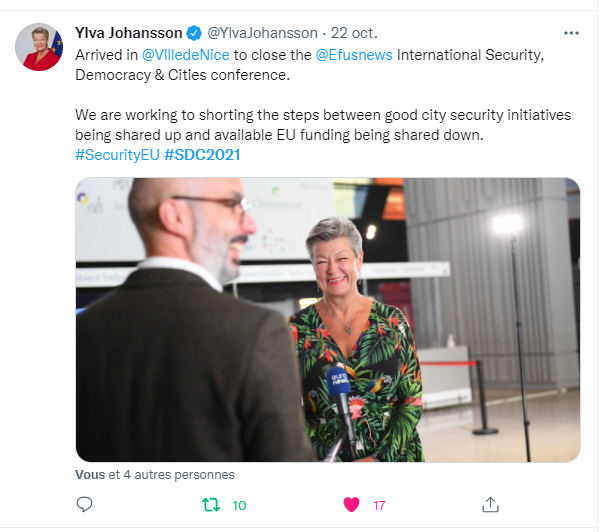
European institutions were strongly represented at the 2021 Security, Democracy and Cities conference, testament to Efus’ constant efforts to represent European local and regional authorities at the European Union level.
Two European commissioners attended in person: Margaritis Schinas, Vice President of the European Commission and Commissioner for Promoting our European Way of Life, gave an address at the opening session and took part in the ‘citizen debate’ organised with members of the public on the first day of the conference, and Ylva Johansson, Commissioner for Home Affairs, gave a keynote speech at the closing session. The European Commissioner for Justice, Didier Reynders, and the Vice President of the European Parliament, Klára Dobrev, contributed through video messages. The Congress of Local and Regional Authorities of the Council of Europe was represented by Jelena Drenjanin, who gave a speech at the closing session.
Furthermore, the conference was placed under the patronage of the European Committee of the Regions; the European Parliament; Elisa Ferreira, Commissioner for Cohesion and Reforms, and under the auspices of Marija Pejčinović Burić, Secretary General of the Council of Europe.
We will shortly publish concise reports on the opening and closing sessions.
What next?
What are the next steps now, and how to build on the conference’s wealth of contents? The Security, Democracy and Cities Manifesto, which expresses the positions of Efus’ member cities on a range of urban security matters, will be updated to include new urban security topics that have emerged from these exchanges. The current version of this key document was published in the wake of the Security, Democracy and Cities conference in Barcelona and in Catalonia, in 2017.
The SDC conference is one of Efus’ main activities: it is a unique moment for Efus members to meet and debate on urban security issues, as well as an opportunity for Efus strengthen its links with European institutions, to grow its network, to agree on bilateral partnerships, and to discuss with international, non-governmental and civil society organisations.
The fact that 700 people gathered in Nice despite the pandemic, which is still prevalent, is proof that our members and partners value such an opportunity for direct exchanges. For Efus, it is also an occasion to showcase its work at the European and international level. In fact, we’ve already started working on the next conference.





